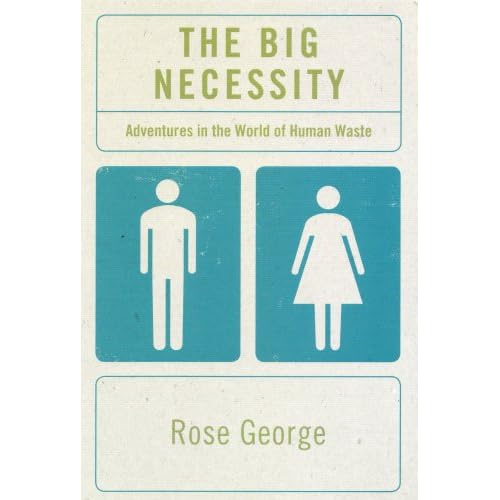Cut the crap - let's talk about excrementCool. I hope the book explains why American toilets are full of water, thus resulting in splash while German toilets don't have any water until the flush.
A brave author boldly ventures into our waste lands
Robin McKie
The Observer, Sunday September 28 2008
Mention Agincourt and English hearts stir with pride. The victory on 25 October 1415, by a ragged army of around 10,000 soldiers over a French army vastly superior in numbers, still evokes profound nationalistic feelings.
The Big Necessity: Adventures in the World of Human Waste
by Rose George
pp326, Portobello, £12.99
What is not often recorded, however, is the fact that half of England's archers fought while naked below the waist. Henry V's army had been ravaged by dysentery. Thus Voltaire concluded England had 'taken victory with its pants down'. Shakespeare, of course, makes no reference to this ailment among the medical complications that were 'had on Crispin's day'. It is not the most delicate of subjects, after all.
Nor have our sensitivities changed much over the centuries. Faeces, excreta-related diseases, diarrhoea and sanitation still tend to be avoided as dinner-table talking points. Terms for excrement remain our conversational taboo, as Rose George notes in this important book. 'Sex can be talked about. Death has once again become conversational. Yet defecation remains closed behind the words, all chosen for their clean association, that we now use to keep the most animal aspect of our bodies in the backyards of our discourse.'
And that is a shame, the author argues. As she notes, Gandhi observed that sanitation was more important than independence. And certainly, for those who lack it, the consequences are usually terrible, as George makes very clear. A total of 2.6 billion people today have no access to clean food or water and lead lives surrounded by human excrement, either in the bushes outside their villages or in their city streets. 'It is tramped back in on their feet, carried on fingers on to clothes, food and drinking water,' says George.
As a result, more than two million people, most of them children, die every year of diarrhoea triggered by faecally contaminated food or water, the equivalent of a child losing his or her life every 15 seconds. Faeces-related diseases kill more people than Aids, TB or malaria.
Yet we appear to lack the language even to discuss this toll or its causes. Hence George's book, a bid to get us talking about the excrement that is killing a third of the planet, a task, we should note, that does have some notable antecedents. Rudyard Kipling thought sewers were fascinating. 'I study 'em and write about 'em when I can,' he announced in 1886. Chekhov described the dreadful sanitation of the Russian isle of Sakhalin, while Freud wrote that humanity would be best advised 'to admit shit's existence and dignify it as much as nature will allow'.
So how does George fare against such august competition in her self-appointed task of bring the topic of sewage out of the water closet? Fairly well, I would say. Given the unappetising nature of her subject, her narrative is surprisingly tasteful and she successfully straddles a fine line between being scatological and silly and being humourless and self-righteous. In the process, we are taken on a grand tour of the sewers of London, whose 37,000-mile network dwarfs all rivals including New York's puny 6,000-mile system and Paris's piddling (sorry) 1,500 miles; we meet the workers who make Japan's deluxe, rim-heated, anus-showering super-lavatories; and we visit the World Toilet Organisation and its international college in Singapore. We discover that James 1 of Scotland was murdered by noblemen while hiding in his privy; that the average human bowel movement weighs 250 grams (about half a pound); and that we each spend, on average, three years of our lives going to the lavatory.
Most important, however, we learn of the profound benefits to be had from properly dealing with our own excrement. Most estimates suggest modern drains, sewers and lavatories have added 20 years to the average lifespan in the West and have brought more benefits than antibiotics, anaesthetics or the Pill. Those who lack these basic necessities face the prospect of disease and death. Bad hygiene and unsafe water cause one in 10 of the world's illnesses. Without sanitation, civilisation is impossible. Hence George's desire that 'we talk frankly about shit'.
• Robin McKie is The Observer's science editor
I must get this book.
***************
Today was a going out visiting day. I went to Devi's place and we waited a few hours for an electrician to finish installing her automatic carport door, then we went to the new DFO (Direct Factory Outlets) complex which had opened a week ago.
We returned to my place, walked Kane and then I cooked a mini lamb roast for dinner with roast potato, sweet potato and asparagus and unfortunately over cooked green beans.

2 comments:
Yes Daniel, I would like to get this book too. Bill and I have been traveling for a few weeks and I will write to you when I have caught up with everything here.
Liz
Cool.
Post a Comment